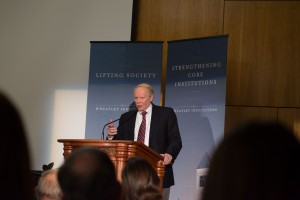
Douglas M. Johnson addressed a full hall at the Hinckley Center on Tuesday, Feb. 23 as the first speaker of the Wheatley International Affairs Conference.
More than 70 students from over a dozen universities around the country were represented at the conference, which meets annually at BYU to address international issues in religion and world affairs.
Johnson comes with a wide background of accolades and a career in international politics.
He spoke on the importance of countering violent religious extremism with faith. “When we as a country have been confronted with religious extremism, our response is usually military in nature. Our response needs to be a response to the ideas behind the guns,” Johnson said. “We need faith-based diplomacy with religion as a part of the solution.”
He continued by stating how faith drives action, and more importantly, empathy.
“It’s not only understanding their point of view, but understanding where they are coming from,” Johnson said. Citing the aftermath of 9/11, he denounced the stigma of empathy being equated with sympathy and sympathy being equated with justifying terrorist actions. “This stigma needs to be broken,” he said.
Drawing on his experience in the International Center for Religion & Diplomacy, Johnson relayed a variety of anecdotes of working in Islamic countries. Over the past decade, he has worked with thousands of madrasas — small colleges for Islamic instruction — in Pakistan and Afghanistan.
In his workshops, the focus was always on promoting wider education and tolerance, reforming the system from the inside out. “Most important was grounding all suggested change in Islamic principles, so they feel that they are becoming better Muslims in the process,” Johnson said. “What we were doing was every bit as strategic as what was going on on the battlefield.”
Such work was far from risk-free, and Johnson highlighted encounters he had had with terrorist commanders that had been resolved peacefully thanks to a mutual respect. He related the story of one terrorist leader who had come to a workshop with the explicit purpose of assassinating the project director.
“As it was, [the director] was just challenging Muslims to be better Muslims,” Johnson said. The man had a change of heart, claiming, in Johnson’s retelling, “‘I have felt the spirit of the holy Qur’an and it is peaceful.’ He’s now trying to raise funds to start a school to promote critical thinking among Muslims,” Johnson said.
Other experiences involved meeting with Taliban leaders in the Afghan mountains to discuss common interests and working with Saudi governments to reform the education system. Johnson noted that while great progress had been made, threats like ISIS make it even more important for people of all faiths and nationalities to come together in a culture of respect and tolerance.
“You can be secular and still understand how important religion is- it’s what drives 86 percent of the world’s population, Johnson concluded. “It’s time to wake up, do our homework, and try to encourage people to study and do their research. We’ve got a lot of catching up to do.”
Halley Gilbert, a student delegate from the University of Idaho, was impressed with what she had learned so far from the conference.
“It was interesting hearing about Islam as a religion, from another religious perspective,” Gilbert said. “I’ve only ever learned about it from a completely objective standpoint. It was cool hearing it from someone who was promoting religion itself and then using that as a method of promoting cooperation.”




